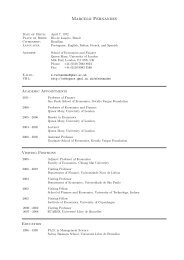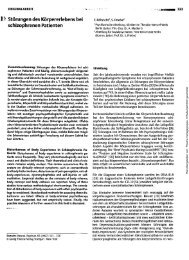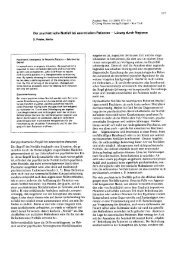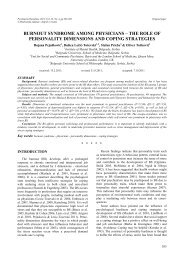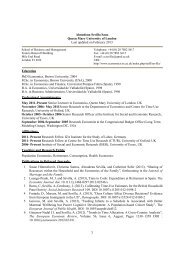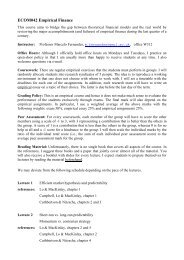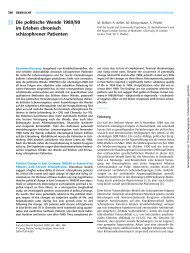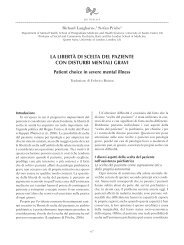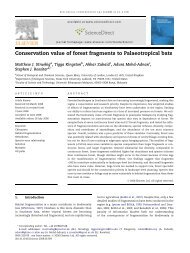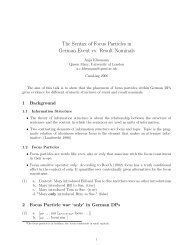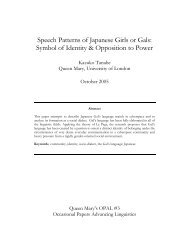Proofs - Personal Webspace for QMUL - Queen Mary, University of ...
Proofs - Personal Webspace for QMUL - Queen Mary, University of ...
Proofs - Personal Webspace for QMUL - Queen Mary, University of ...
Create successful ePaper yourself
Turn your PDF publications into a flip-book with our unique Google optimized e-Paper software.
With regard to content, the pilot assessment revealed<br />
weaknesses in the explanation <strong>of</strong> questions and instructions <strong>for</strong><br />
interviewers. We were able to improve this <strong>for</strong> the assessment<br />
<strong>of</strong> the community mental health care system in Mitte district.<br />
Overall the assessment tool could not be shortened by the<br />
pilot survey. Instead, in the end, it comprised 16.5 pages/157<br />
items. But the length <strong>of</strong> the documented interviews appeared feasible<br />
with an average number <strong>of</strong> 1.5 hours duration. Interviewees<br />
did not complain about it and seemed to be motivated. As a fi nal<br />
product, an assessment tool <strong>for</strong> the current status <strong>of</strong> “intercultural<br />
opening” in the community mental health care system 3 was<br />
developed using a three- stage procedure (Fig. 3).<br />
4. Discussion<br />
Based on pre- existing questionnaires and checklists [15,5,29]<br />
aiming to assess interculturally opened institutions but either<br />
developed <strong>for</strong> self- examination, focusing only on specifi c aspects<br />
<strong>of</strong> “intercultural opening” and missing validation we constructed<br />
a tool <strong>for</strong> broad assessment via an expert- based Delphi process<br />
and pilot study. The resulting assessment tool is the fi rst<br />
one to give an all- around assessment <strong>of</strong> the current status <strong>of</strong><br />
“intercultural opening” in mental health care sector in Germany.<br />
It could be used in further studies as well as an instrument <strong>for</strong><br />
self- evaluation and quality management. With little changes<br />
concerning response categories the tool could also be used in<br />
other care facilities, which should be piloted fi rst.<br />
To a very large extent, the experts <strong>of</strong> the Delphi process felt<br />
that all the items in the preliminary assessment tool composing<br />
“intercultural opening” were essential. But as an assessment<br />
tool should not be too long, we had to apply a strict defi nition <strong>of</strong><br />
consensus <strong>of</strong> the Delphi process. We could not take into account<br />
at least one dissenter (xmod=10). The defi nition <strong>of</strong> xmod=10<br />
would have identifi ed further 54 items reaching consensus<br />
which there<strong>for</strong>e should have been kept in the assessment tool.<br />
Nevertheless each main topic <strong>of</strong> the developed preliminary<br />
instrument was confi rmed by the experts <strong>of</strong> the Delphi process.<br />
Only subordinated items were dropped out. Contrary to<br />
the result <strong>of</strong> the Delphi process we decided to keep questions<br />
in the assessment tool concerning issues being important<br />
<strong>for</strong> the structure <strong>of</strong> the tool or <strong>for</strong> one goal <strong>of</strong> the upcoming<br />
assessment.<br />
Because <strong>of</strong> the defi nition <strong>of</strong> consensus used in the Delphi<br />
process, we did not take into account the exact distribution <strong>of</strong><br />
expert opinions with regard to the judgment <strong>of</strong> “very important”<br />
or “important”. There<strong>for</strong>e we decided to use these distributions<br />
<strong>for</strong> building up a scale judging the current status <strong>of</strong> “intercultural<br />
opening” <strong>of</strong> each assessed institution in detail when analyzing<br />
the data. That means the implementation <strong>of</strong> aspects which have<br />
mostly been judged as very important by experts in the Delphi<br />
process have to be weighted higher than others which have<br />
mainly been validated as “important”.<br />
The pilot study represented another important part, as it<br />
combined theoretical with practical expertise. Further revision<br />
and optimization <strong>of</strong> the preliminary assessment tool was<br />
3 See: http://www.segemi.de/delphiprozess/download/IKOE_P_1_English.pdf<br />
S. Penka et al. / European Psychiatry 27 (2012) / supplement n°2 / S63-S69 S67<br />
possible, as it gave important insight into the actual practice <strong>of</strong><br />
each type <strong>of</strong> institution. One item, taken out <strong>of</strong> the assessment<br />
tool as a result <strong>of</strong> the Delphi process, had to be added again as<br />
its importance in actual practice became apparent in the pilot<br />
survey data. This example highli ghts the importance <strong>of</strong> our<br />
three- stage procedure, as Linstone pointed out that a panel <strong>of</strong><br />
experts does not constitute expertise on human behavior, group<br />
dynamics and the whole system [21].<br />
In the pilot survey we did not ask interviewees <strong>for</strong> missing<br />
aspects with regard to improved accessibility and the quality<br />
<strong>of</strong> treatment <strong>of</strong> migrants as the goal <strong>of</strong> the study project is to<br />
check the concepts’ implementation, which has been discussed<br />
in Germany <strong>for</strong> many years, and its actual effect on the actual<br />
practice. Through additional fi eldwork and qualitative interviews<br />
in selected institutions we will gain some more details about<br />
experiences and opinions <strong>of</strong> staff which will be important <strong>for</strong><br />
the later evaluation <strong>of</strong> the concept <strong>of</strong> “intercultural opening”.<br />
As the assessment <strong>of</strong> the current status <strong>of</strong> “intercultural<br />
opening” is at risk <strong>of</strong> being infl uenced by answers given <strong>for</strong><br />
reasons <strong>of</strong> “social desirability”, we can also compensate this<br />
with these additional methods and complete the results.<br />
Our tool is directed to assess institutional level policies, however<br />
individual cultural competencies are a crucial part <strong>of</strong> the<br />
institutional level concept <strong>of</strong> “intercultural opening” [2,13,14,25].<br />
There<strong>for</strong>e, we decided to assess the cultural competency <strong>of</strong> the<br />
staff in some selected institutions in parallel independently from<br />
our survey applying one pre- existing checklist [e.g. 10].<br />
In Germany and other European countries a new approach is<br />
increasingly needed <strong>for</strong> dealing with barriers to social or health<br />
care systems and improving quality <strong>of</strong> treatment <strong>for</strong> migrants,<br />
based on “responsiveness to diversity” [8,7]. Contrary to “intercultural<br />
health strategies”, diversity concepts focus on all aspects<br />
<strong>of</strong> the variety <strong>of</strong> pluralistic societies, e.g. gender, disabilities,<br />
marginalized population, socio- economic status [27]. One <strong>of</strong><br />
the multiple benefi ts is that the focus is no longer placed on<br />
migrants and there<strong>for</strong>e the reproduction <strong>of</strong> difference in terms<br />
<strong>of</strong> migrants is s<strong>of</strong>tened. However in Germany, the adoption<br />
<strong>of</strong> this approach is only reluctantly accepted [27], while the<br />
concept <strong>of</strong> “intercultural opening” has achieved political and<br />
practical support and gained a central status. The developed tool<br />
represents the German concept <strong>of</strong> “intercultural opening” and<br />
does not aim at Diversity Strategies being increasingly important<br />
in Europe [7,8]. We decided to pick Germany up where the actual<br />
political and practical discussion is right now. With the help <strong>of</strong><br />
the investigation <strong>of</strong> the concept <strong>of</strong> “intercultural opening”, on<br />
which our study project is focusing, the discussion in Germany<br />
will perhaps be pushed <strong>for</strong>ward.<br />
No comparisons exist about European “intercultural health<br />
strategies” [23] and the “Cultural Competence” approach <strong>of</strong> the<br />
United States [1,3], which at fi rst glance appear very similar. Even<br />
within Europe, there is little known about the actual procedure <strong>of</strong><br />
each country in detail. A future goal might be an analysis about<br />
these different approaches <strong>for</strong> improving global transparency in<br />
dealing challenges <strong>of</strong> migration.<br />
In addition to the detailed presentation <strong>of</strong> the development<br />
process <strong>of</strong> our assessment tool <strong>for</strong> demonstrating the benefi ts <strong>of</strong><br />
our approach and being a model <strong>for</strong> future studies, this paper has<br />
intended to increase transparency in relation to the current German<br />
approach <strong>of</strong> health care structures in dealing with migrants.<br />
<strong>Pro<strong>of</strong>s</strong>



